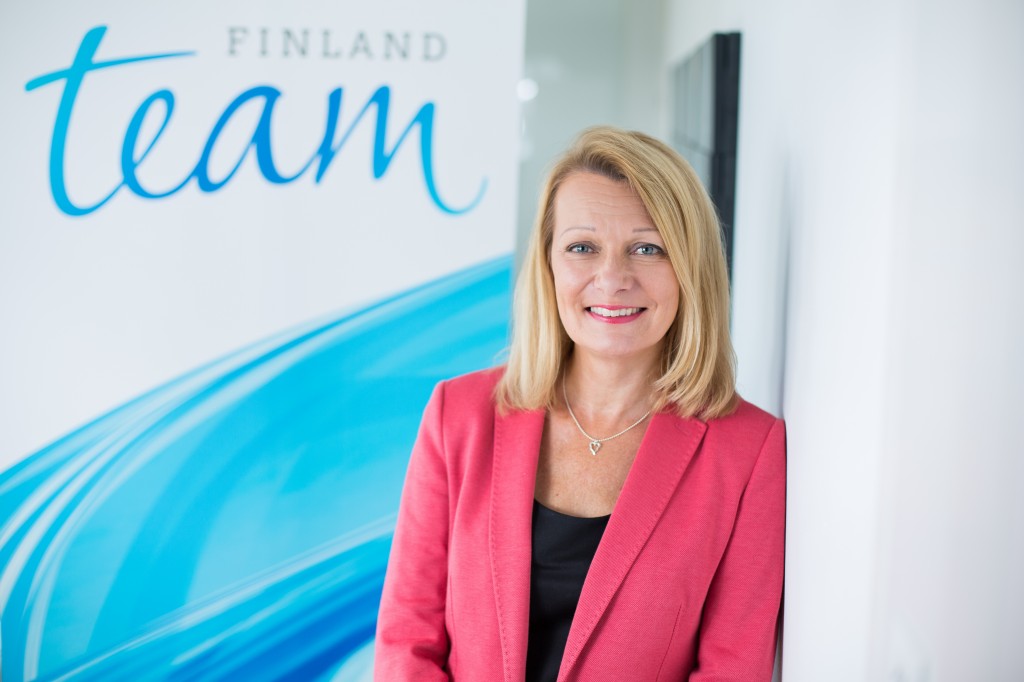ASTANA – Minister for Foreign Trade of Finland Lenita Toivakka will lead a major business delegation on a trip to Kazakhstan from Oct. 4–7 to deepen economic cooperation and trade and develop relationships within Kazakhstan’s educational system, industrial sector and green technology industry, she told The Astana Times on Oct. 2.
“The business delegation accompanying me is one of the largest groups of Finnish business leaders and representatives ever to visit Kazakhstan. Its composition reflects well what we Finns want to offer to Kazakhstan: There are 43 companies and educational institutions, 18 of them represent vocational institutions, universities and universities of applied sciences and top-class companies specialising in solutions to facilitate learning. Eleven companies are world leaders in clean tech and 14 companies represent other sectors like construction and logistics. These are good examples of how Finnish companies want to have more cooperation and trade [here],” she said.
Bilateral relations have always been very good, she said, and Kazakhstan is Finland’s biggest trading partner in Central Asia. “From our side we want to further deepen this relationship and make the most of existing potential.”
Trade also provides a good foundation to expand cooperation into other areas, like investments, technology or sustainable development, Toivakka said. In these areas, the minister sees huge potential for cooperation.
“Developing modern bioeconomy is one of the strategic targets in Kazakhstan,” she said. “The Finnish government has designated bioeconomy, where Finnish companies are very strong, as one of the so-called spearhead projects in Finland. Our companies have developed top solutions to utilise different kinds of waste and bio-based raw materials for production of bioenergy.”
The country is also strong in combined heat and power and district heating and cooling solutions, she said. Finland, like Kazakhstan, is very cold, Toivakka notes; like Kazakhstan, it is relatively large, with a low population density. Finland’s expertise should find a natural home here. “Finnish companies are very strong in energy efficiency and energy saving solutions in the following areas: new construction and renovation, industrial processes and control, smart grids, monitoring and connecting users of renewable energy to main grid.” Small towns and villages in Finland are also brimming with off-grid solutions and know-how, she noted, also useful to be shared, or swapped, with Kazakhstan.
The visit to Astana is also a fact-finding mission on preparations for EXPO 2017, which Toivakka said her government will make a decision on around the turn of this year.
“The theme of the EXPO 2017 (Future Energy) is extremely important and topical,” Toivakka said. The country has already sent an expert to explore the possibilities the expo offers Finland; this fall, the Finnish government will discuss its participation and consult interested companies, she said.
The minister is also hoping to boost cooperation in education based on a memorandum of understanding on the subject signed between the two countries in 2009, and on new agreements signed during this trip. Toivakka sees significant potential for cooperation in vocational education and training and higher education, both spheres Kazakhstan is working to develop. Both countries value and invest in education, she noted, and see it as crucial to their continued development.
“Finland has a high-quality vocational education system with highly competent teachers. Our vocational education and training is, in fact, considered a highly attractive choice among students – both young [students] and adults,” the minister said.
In addition to expertise with quality assurance mechanisms, vocational teacher education and in utilising information technologies in education, Toivakka says she believes her country has valuable lessons to share in combining education and working life. “Indeed, a deep, practical and interactive cooperation with the working life and companies is fundamental for our system. The needs of working life are carefully taken into account in the development of qualification frameworks and curricula. This ensures the relevance of education.” Kazakhstan, through moving to a more targeted approach with its Bolashak scholarship programme by consulting with major employers on their needs, is taking steps to ensure the relevance of its higher education as well.
Toivakka also encouraged more Finnish and Kazakh students to take part in exchange programmes, like the Erasmus+ programme. “There is also true potential for increasing the mobility of higher education students, teachers and researchers between our countries.”
The number of actors in educational cooperation between Finland and Kazakhstan has increased remarkably over recent years, she said, and now covers many sectors, including health and social services, vocational teacher education and even pilot training. Toivakka is confident that it will keep expanding.
“I think we both share the deep understanding that education is the key for wellbeing in our societies and the foundation of economic competitiveness,” she said. “We also have many common interests and features like the desire to make our life easier with the help of technological innovations and the persistence due the harsh climate.”
There are no obstacles to future cooperation, Toivakka said. “Both Finland and Kazakhstan are seriously interested in deepening our relations in various fields.”


